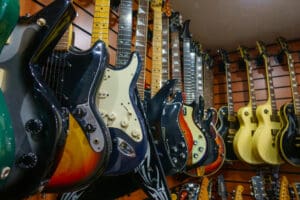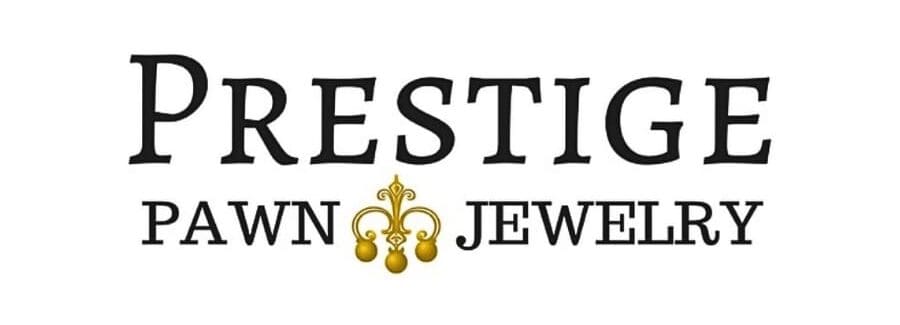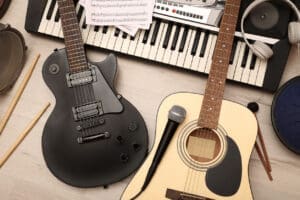Stepping into a pawn shop with your beloved musical instrument can feel like crossing into uncharted territory. But, navigating the world of Pawning Musical Instruments doesn’t have to be daunting. This handbook illuminates the path, detailing how to grasp your instrument’s worth and secure an optimal transaction.
Musicians and enthusiasts frequently find themselves in pawn shops, seeking speedy financial relief or hunting for undiscovered gems. We’ll dive deep into which instruments fetch top dollar and how condition impacts price. Plus, you’ll learn negotiation tactics that could make all the difference at the counter.
Ready to transform uncertainty into confidence? Let’s get started on making sure you walk out of that pawn shop satisfied, whether buying or selling.
Table of Contents:
- Pawning Musical Instruments
- High-Value Instruments at Pawn Shops
- Preparing Your Instrument for Pawn or Sale
- Negotiating Your Deal at the Pawn Shop
- Buyer’s Guide to Purchasing Pawned Musical Instruments
- The Impact of Condition on Pawn Value
- Pawn Shop Regulations You Should Know About
- FAQs in Relation to Pawning Musical Instruments
- Conclusion
Pawning Musical Instruments
When you’re eyeing your beloved instrument, thinking it might be time to let go for some quick cash, knowing the ins and outs can make a world of difference. Whether it’s an electric guitar that has seen better days or a drum set gathering dust, pawn shops often become sanctuaries for musicians looking to sell their gear.
Why Pawn Shops are a Go-To for Musicians
Musicians frequently turn to local pawn shops because they offer instant solutions. Unlike music stores which may only cater to specific instruments or have consignment processes that take longer, pawn shops provide immediate cash. This is particularly appealing when unexpected expenses arise or when funding new musical endeavors becomes necessary.
Moreover, the inventory changes regularly at these establishments. One day you could find vintage acoustic guitars; another day might reveal pro audio equipment ripe for the picking. For those selling musical instruments, this means there’s almost always demand regardless of what type of instrument you’re looking to unload.
Understanding Your Instrument’s Value
To get the best deal possible at a pawn shop requires some homework on valuation. The condition plays a huge role in how much money you can expect – clean and well-packaged items fetch higher prices. If available, including original packaging adds more value during negotiations.
Kicking off with realistic expectations about your musical instrument’s market worth ensures smoother transactions whether buying or selling at these venues.
High-Value Instruments at Pawn Shops
Electric and Acoustic Guitars
Guitars, whether they’re electric guitars, acoustic guitars, or bass guitars, often strike a chord with pawn shops. Guitars, coveted for their melody and rhythm, frequently emerge as top treasures in the quest for pawn shop gems. So if you’ve got a guitar collecting dust in your closet, it might just be your ticket to quick cash.
Pawn shops look for well-maintained instruments that resonate with both beginners and seasoned players. Remember that unique models or those associated with renowned brands can fetch you an even better deal.
Drum Sets and Brass Instruments
Full drum sets command attention in pawn shops due to their higher price tags when new. If you have one lying around, ensure it’s in good condition before heading to your local pawn shop; this could significantly bump up its value.
Likewise, brass instruments like French horns are rare finds but highly valued by pawnbrokers. They not only add variety to the inventory but also cater to specific buyers looking for such unique pieces.
Preparing Your Instrument for Pawn or Sale
Getting your musical instrument ready for a pawn shop adventure means more than just wiping off the dust. Clean and well-packaged instruments stand out, giving you an upper hand in fetching a higher price.
The way you wrap up your instrument can really turn the tables in your favor. Instruments housed in their original packaging not only scream ‘well-cared-for’ but also bump up the value of your deal significantly. It’s like telling potential buyers, “This one’s been treated right.” So, before heading to your local pawn or music store, make sure that guitar or saxophone is looking its best and snugly fit into its original box if possible.
Cleaning goes beyond mere aesthetics; it can actually impact functionality. Dust and grime can interfere with how an instrument plays, which is why giving it a thorough clean isn’t just about making it look pretty – although that certainly doesn’t hurt either. Accessories are part of this package too; they’re often overlooked but equally important in sealing a good deal.
Negotiating Your Deal at the Pawn Shop
Walking into a pawn shop with your musical instrument, aiming to get a fair price, can feel like stepping onto a stage. But fear not; knowing your negotiation skills and understanding your instrument’s value are your best tickets to success. Mastering the art of bargaining hinges on thorough groundwork.
Firstly, assess the condition of your item. Clean and well-packaged instruments have been shown to fetch higher prices. If you still have the original packaging and any accessories, make sure they’re part of the deal—this could significantly increase what pawn shops are willing to offer you.
Beyond aesthetics, having an idea of what your instrument might be worth in current market conditions can set the stage for fruitful negotiations. Sites like Syd Mors Jewelry & Pawn give insight into inventory changes and typical valuation ranges for various instruments. Remember that while cash might be king in these establishments, knowledge is power—knowing beforehand how much similar items sell for helps ensure you don’t undersell or overshoot during discussions.
Buyer’s Guide to Purchasing Pawned Musical Instruments

Finding the perfect pawned musical instrument is like uncovering a hidden gem in a treasure chest. However, prior to diving into this quest, grasping what you desire and identifying the top bargains is crucial.
Testing the Instrument
When considering buying a musical instrument from a pawn shop, testing the instrument within the shop should be your first move. This hands-on approach lets you get a feel for its condition and sound quality—two critical factors that can’t be fully appreciated through pictures or descriptions alone. Always bear in mind, diving into a purchase without checking the instrument might reveal unexpected and expensive secrets.
Checking for Damage or Refinishing Signs
Beyond playing some notes or chords, keep an eye out for any signs of damage or refinishing. Observing these signs is crucial as they could diminish both the worth and functionality of what might soon become your cherished instrument. A glossy finish might mask underlying issues while missing parts could signal rough handling in its past life. Digging deep into every nook and cranny, searching for any harm or signs of a touch-up job, helps you protect your investment from future disappointment.
The Impact of Condition on Pawn Value
When you’re looking to sell or pawn your musical instruments, remember that their condition plays a pivotal role in determining their appraisal value. Whether it’s an acoustic guitar, electric bass, or even brass instruments like french horns, each has its own set of criteria for valuation.
A well-maintained instrument not only sounds better but also appeals more to buyers and pawn shops alike. For instance, clean and well-packaged instruments are likely to fetch higher prices at local pawn shops. It’s a simple truth: the better care you’ve taken of your instrument, the more cash it’s going to bring in.
Tossing in the original box and extras might just bump up your offer considerably. This is because original cases and accessories often indicate careful ownership and reduce risks associated with damage during storage or transport. So before heading out to get your instrument appraised at a shop known for buying musical gear, give it some love—clean it up and make sure all parts are functioning as they should be.
Pawn Shop Regulations You Should Know About
When you’re considering pawning your beloved musical instrument, it’s crucial to know the rules of the game. The legal landscape for pawn shops is more complex than you might think. Navigating through this, you’ll find a web of rules designed to safeguard the interests of both parties involved.
First off, all pawn brokers must comply with state laws and hold a valid business license to operate legally. This ensures they conduct their business ethically and within the bounds of local legislation. But there’s more: two major federal laws come into play – the US Patriot Act and the Truth in Lending Act.
The US Patriot Act, among other things, helps prevent money laundering through detailed record-keeping requirements for pawn transactions. Meanwhile, the Truth in Lending Act mandates clear communication about loan terms from lenders to borrowers – this includes interest rates and any additional fees involved in pawning items. Knowing these regulations can make sure you get fair treatment when seeking quick cash or buying instruments from a local pawn shop.
FAQs in Relation to Pawning Musical Instruments
How much will a pawn shop give you for a trumpet?
Pawn shops might offer around $50 to $200 for trumpets, depending on brand, condition, and demand.
What is the most valuable thing to pawn?
Jewelry often tops the list due to its small size and high value. Think gold or diamonds.
Are musical instruments worth money?
Absolutely. Brand name guitars, pianos, and violins can fetch thousands if in good nick.
How do I sell my used musical instrument?
Sell directly online via eBay or Reverb.com. For local deals, try Craigslist or Facebook Marketplace.
Conclusion
Stepping into the world of pawning musical instruments, you’ve armed yourself with knowledge. From understanding an instrument’s value to mastering negotiation at the pawn shop counter.
You learned why musicians flock to local pawn shops for quick cash and gems waiting in their inventory. You discovered guitars and brass are gold mines, while condition reigns supreme in determining worth.
Pawn smartly by preparing your instrument and honing your haggling skills. Remember, every visit can end in satisfaction whether buying or selling if you keep these tips close.
In this journey through music’s marketplace, remember: Knowledge is power. Use it well as you navigate the vibrant world of pawn shops across South Florida or anywhere else fortune takes you.
Don’t wait any longer – take the next step and visit Prestige Pawn & Jewelry today! Our experts are here to assist you with your pawn, buying, and selling needs. Experience the prestige and exceptional service that sets us apart. Contact us now or visit our store to begin your journey into the world of luxury and value.

